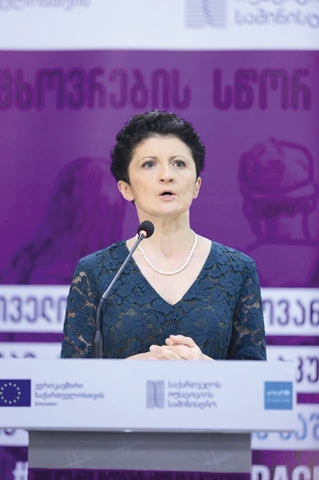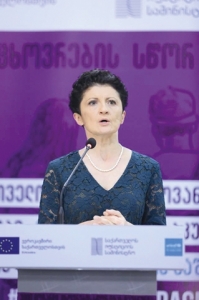Celebrating 3,000 Youth who Benefitted from the Juvenile Justice Reform
Over 3,000 juveniles have benefited from juvenile justice reforms which have been carried out in Georgia through the joint efforts of the Georgian Justice Ministry, the EU and UNICEF since 2010.
On October 31, the Minister of Justice and representatives of the EU and UNICEF launched a campaign celebrating the success of their co-operation on juvenile justice reforms in Georgia. The week-long media campaign will highlight two key achievements:
• Over 3000 juvenile offenders, aged 16-21, have benefited from deviation and mediation activities, allowing them to atone for their crimes while avoiding the possible negative aspects of criminal prosecution;
• Introduction of child friendly spaces and procedures to the Georgian Justice system, including the opening of first child-friendly room in Rustavi City Court.
The above-mentioned achievements come as part of the adoption of a modern Juvenile Justice Code in Georgia in 2015.
The keynote speakers of the event included Carl Hartzell, Ambassador of the European Union to Georgia; Tea Tsulukiani, Minister of Justice of Georgia; Ghassan Khalili, UNICEF representative in Georgia; and Justice Renate Winter, Team Leader of the EU4Justice project and Chairperson of the UN Child Rights Committee.
Within the framework of the event, the screening of UNICEF video: Re-creation of the Story of Dato, a diverted child, was also held. The video is based on real facts and depicts the story of a young boy who was diverted from the criminal justice system and given the chance to work instead of going to prison.
Lado Javakhishvili, Head of the Diversion and Mediation Department, LEPL Center for Crime Prevention, and Teona Kuchava, Child Protection Officer, Juvenile Justice, UNICEF, gave presentations of two main areas of the campaign: the diversion and meditation program, which represents an alternative approach to criminal prosecution, and child-friendly environments.
The follow-up of the event was the official opening of a newly furnished child-friendly room in Rustavi City Court by representatives of the Ministry, EU and UNICEF. Child-friendly environments involve the creation of a physical environment that enables an interview to be conducted in a space that is friendlier for children. Through this process, child-based procedures and methods are used.
The child-friendly environment serves on one hand as a protection of the best interests of a child, specifically making sure that during the proceedings any further child abuse cases does not occur. At the same time, the environment adapted to the child serves the interests of justice as well, because the information obtained by a specialized professional in a child-friendly methodology is more reliable.
Speaking at the event, Ambassador Hartzell stated that since 2010, the EU has been working closely with the Government of Georgia in reforming its justice system and an important part of this has been to meet the needs of juveniles. According to him, through joint efforts, all children will be better treated in any interaction with the justice system, whether as a victim, offender or witness.
“We are very happy to see that we now have a Juvenile Justice Code that is holding up to the highest standards worldwide and that we are able to work together in this direction. To implement the rules of the game, we have been focusing very much on two important aspects. One of them is about creating a more efficient and child-friendly approach to juvenile offenders based on rehabilitation rather than punishment only. We believe that it is right for children and for the entire society in terms of getting their children a second chance to find their place in life and be productive. The other issue that has been our focus is creating a more child-friendly environment in the courts, which is implemented for the benefit of children as witnesses,” he said.
According to Minister Tsulukiani, through the close collaboration between the EU, UNICEF and the government, the Georgian juvenile justice system in has been significantly improved.
“The juvenile justice reforms turned out to be very successful and effective. Through the new reforms implemented in recent years, 3000 kids are back on track and have a second chance at finding their place in life. I would say to children that of course, bad behaviour cannot be accepted or justified. However, sometimes foolish things and mistakes made in childhood turn out to be a crime. It is the government’s obligation to divert a child from the justice system via alternative ways such as community works or educational activities in cases of mild crimes. The government must not send 10-13-year-old children to prison for making a mistake, and if they are older than 14, imprisonment should be the last solution and priority should be given to alternative methods undertaken by specialized police officers and judges. I would directly say that thanks to this new system, 3000 kids have survived and are now on the right path of development,” Tsulukiani told journalists.
Thanks to EU support, specialized professions received training to enable them to provide more child-friendly treatment. This included 40 specialized prosecutors, 35 lawyers, 30 judges and 30 police officers being trained on international juvenile justice standards, domestic legislation and practice, psychological issues concerning children in the justice system and interviewing of child victims and witnesses of crime.
Ghassan Khalili, UNICEF representative in Georgia, stated that the adoption of the Juvenile Justice Code was a genuine achievement in bringing the juvenile justice system closer to international standards.
“UNICEF has been partnering with the government and EU to implement the juvenile justice reform which includes specialization of all professionals working with children, creation of a child-friendly environment in all appropriate agencies and strengthening child rights monitoring and quality assurance mechanisms. We are committed to continuing this partnership and giving more young people a second chance in life,” Khalili noted.
As for the challenges and difficulties existing in this direction, the UNICEF representative stated that continuing on the same level and with a similarly active collaboration with various agencies is the main challenge.
“Continuing with the same momentum and close partnership with the Ministry of Justice and other government agencies is the most important thing. UNICEF is committed to maintaining this strong partnership. The juvenile justice system is a very good tool to provide a better future for children who pass through difficulties. Accordingly, this partnership should continue in order to provide a model which will be an example for the other countries to learn from this successful experience. I appreciate the efforts of Rustavi City Court to have a child-friendly room, and this model must be implemented in the regions of Georgia as well,” he told reporters.
The reforms of the juvenile justice system have been one of the biggest success stories of EU-Georgia co-operation in the justice sector in recent years. The reforms produced tangible results for children in the criminal justice system from the very start. Examples of positive achievements include:
• The number of convinced juveniles decreased from 1,116 (2008) to 381 (2014)
• The use of custodial sentencing fell from 40% (2007) to 27% (2014)
• The use of pre-trial detention also declined from 40% (2010) to 18% (2014)
• The diversion and mediation program, piloted in six major cities, was extended to 15 locations
• Over 888 children were diverted from the criminal justice system (2010-2015)
The EU continues to support the juvenile justice reforms in co-operation with UNICEF, as well as through different projects with the ministries of justice, internal affairs, prosecutors, police, lawyers, legal aid providers, social workers and NGOs.
By Ana Dumbadze
Photo by EU in Geogia press office












